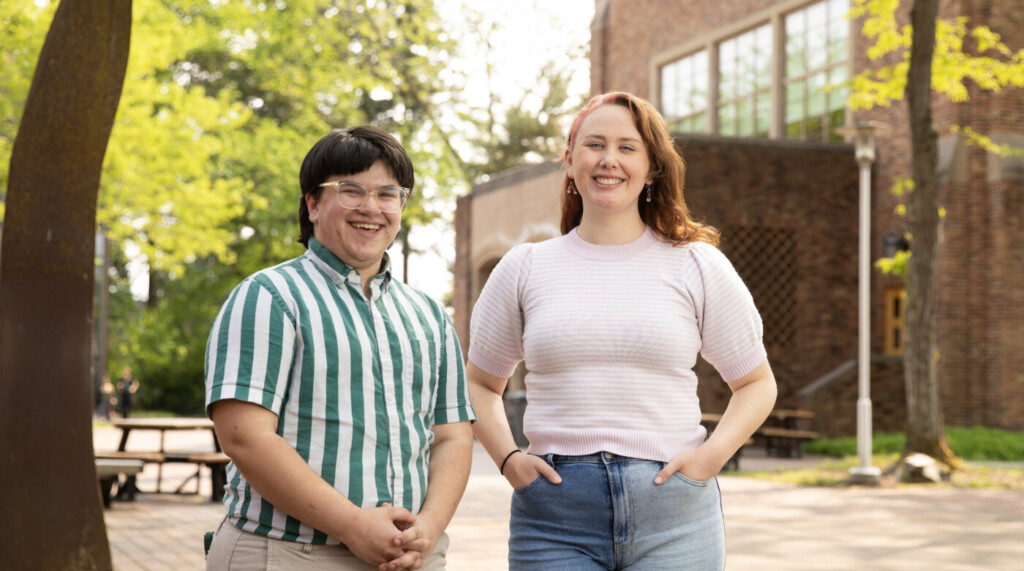Page 133 • (1,416 results in 0.102 seconds)
-
major decision, you need three things: Time, Information, and Commitment. Time to consider all the options, to think about implications of your decision, and time to do the work necessary to make a decision. Information so your decision is based on your own experiences and you can compare statistics, data, knowledge and advice. Commitment to follow through, to make decisions and review your progress regularly. What Do I Want To Study? The question to consider is specific: “What do I want to study
-

most critical issues we could tackle, so I had to commit myself to this work. But I also grew up in the community and high school theater scenes. Storytelling is such an important aspect of the human experience. I was encouraged to connect the two and have realized that environmentalism, activism and art have historically been interconnected. Climate change involves a lot of data. Numbers and statistics are a lot for folks to digest, but art, theater, visual and music can help get information
-
. Among the definitions of cheating included in PLU’s policy on Academic Integrity is “[the use of] information or devices not allowed by the faculty, such as formulas or a computer program or data….” Given the aims and the realities mentioned above, and in light of PLU’s policy on Academic Integrity, the Department of Global & Cultural Studies issues the following guidelines on the use of machine translation for students of language, literature, and culture: The use of machine translation in the
-

high school graduation. Climate change was one of the most critical issues we could tackle, so I had to commit myself to this work. But I also grew up in the community and high school theatre scenes. Storytelling is such an important aspect of the human experience. I was encouraged to connect the two and have realized that environmentalism, activism and art have historically been interconnected. Climate change involves a lot of data. Numbers and statistics are a lot for folks to digest, but art
-

up clinically, including high risk-scenarios that you want a student to be educated in how to handle,” says School of Nursing Dean Barbara Habermann. Research indicates that more higher-level decision-making happens in simulation than in a clinical setting, Kushner says. In a clinical setting, students are often involved in care but are accompanied by a nurse who makes most decisions. In a simulation lab, the students are assessing the situation, interpreting data, and making decisions. Thanks to
-

most critical issues we could tackle, so I had to commit myself to this work. But I also grew up in the community and high school theatre scenes. Storytelling is such an important aspect of the human experience. I was encouraged to connect the two and have realized that environmentalism, activism and art have historically been interconnected. Climate change involves a lot of data. Numbers and statistics are a lot for folks to digest, but art, theater, visual and music can help get information
-

how to code for websites and slowly built up her skills and experience. During her experiences designing websites for small businesses, she discovered how she loved applying her visual and coding skills to build out the blueprint for how someone interacts with software or web applications. “I often say that design is a glue to hold the user to the data,” Avila said. “It’s a designer’s job to help you find and make that connection. “Did we prepare you to be ready for the job? To be adaptable? To be
-

and the outlying areas, so they rotate (the water) through the districts,” he says, raising his voice over the growl of the drill. Did You Know? 82% of the population of Nicaragua lives on less than $1 a day. 30% of the population of Nicaragua does not have access to clean water. 63% of the population of Nicaragua does not have access to adequate sanitation. * Data provided by Living Water International Day Two: El Limonal, Nicaragua Church Courtyard Drill Depth: 150 Feet T he pump has broken down
-
. Obtain the Material Safety Data Sheet (MSDS) or Safety Data Sheet (SDS) on the chemical, if known. If students are exposed they should report immediately to the PLU Health Center at 253-535-7337. If staff or Faculty members are exposed, they should report immediately to the nearest Medical Center Emergency Room. Contact Campus Safety at 253-535-7911. If after hours, they should call 911. Radioactive Material Spill NEVER clean up a radioactive material spill unless you have undertaken the required
-
Experiences of First Generation Latino Professionals. This book will combine qualitative interviews, auto-ethnography, and policy analysis to explore the public policies and programs, which helped members of the largest ethnic and racial group in the U.S. lacking in inherited intellectual capital earn college degrees and enter the professions. This research underscores the importance of public policies in keeping the pipeline to the professions open to members of underrepresented communities. I live in
Do you have any feedback for us? If so, feel free to use our Feedback Form.


